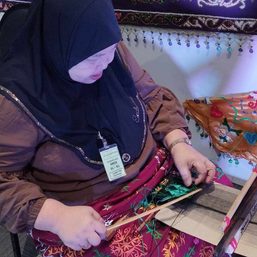SUMMARY
This is AI generated summarization, which may have errors. For context, always refer to the full article.
MANILA, Philippines – Time is running out for broadcast giant ABS-CBN, as Congress has yet to approve bills renewing its legislative franchise that would allow its continued operations.
On March 30, 2020, Republic Act No. 7966, which approved ABS-CBN’s franchise for 25 years, will expire.
Measures seeking to grant ABS-CBN another 25 years in broadcast operations have been filed as early as July 1, 2019, the first day the 18th Congress opened the filing of bills.
Until now, none has been approved.
In the 17th Congress, it took less than 3 months of congressional session for the franchise of a mainstream broadcast company to get approved.
With ABS-CBN’s franchise, what’s taking Congress so long?
Quick approval
During the 17th Congress, at least 50 national and local broadcast franchises were signed into law by President Rodrigo Duterte.
An in-depth look at the franchise approvals of national broadcast firms showed how quickly they hurdled Congress in the 17th Congress, except for ABS-CBN.
Particularly, we looked at the approvals of TV and radio broadcast firms GMA Network, TV5, and Manila Broadcasting Company (MBC); the religious broadcast arm of the Catholics Bishops Conference of the Philippines (CBCP); and MBC-subsidiary Pacific Broadcasting System Inc, which relays radio station DZRH in the provinces.
Rappler computed the number of days it took the chambers’ plenaries to pass the measure, from the day the committee report was filed up to the day it was approved on 3rd reading. Days when Congress was adjourned were excluded.
On average, it took the House of Representatives around 13 days to pass a franchise bill, once the committee report had been filed by Palawan 1st District Representative Franz Alvarez, chair of the House panel on legislative franchises.
GMA Network
The quickest passage in the lower chamber was for the franchise of GMA Network, the first to be renewed under the Duterte administration.
It took congressmen just 11 days to approve the measure. The committee report on GMA’s franchise was filed on December 7, 2016, signaling the start of plenary debates once sponsored on the floor. Congress then went on break from December 17, 2016 to January 15, 2017.
When the 17th Congress resumed, GMA Network’s franchise had been approved by the lower house on 3rd and final reading on January 16, 2017. It was later signed into law on April 21, 2017.
CBCP
CBCP did not encounter any roadblocks at the House too, despite being a vocal critic of the Duterte administration under the presidency of Lingayen-Dagupan Archbishop Socrates Villegas.
When Congress took up CBCP’s renewal for broadcast operations, Duterte’s friend Davao Archbishop Romulo Valles was already leading the bishops’ conference. (READ: Incoming CBCP head views self as Duterte’s ‘friend-sinner’)
It took 21 days for its permit to be approved.
ABS-CBN, Pacific Broadcasting System
In the case of ABS-CBN, at least 3 lawmakers have filed bills seeking to renew its broadcast operations. But these were never taken up by the House committee on legislative franchises:
- House Bill 4349 filed by Nueva Ecija 2nd district Representative Micaela Violago for ABS-CBN Corporation
- House Bill 8163 filed by brothers Davao City 1st district Representative Karlo Nograles and PBA Party List Representative Jericho Nograles
Like ABS-CBN, Pacific Broadcasting System’s franchise was approved on March 30, 1995 under Republic Act 7967. It is also set to expire on March 30, 2020, but its renewal was approved by Congress during the 17th Congress.
At the Senate, it took Senator Grace Poe, the Senate committee on public services chairperson, an average of 32 days or a month to get a franchise bill to be approved by senators, once a commitee report had been filed.
Among mainstream broadcast firms, passage took the longest time with the Pacific Broadcasting System’s franchise for a total of 80 days or less than 3 months, as it was lumped with other regional firms.
The committee report on Pacific Broadcasting System’s franchise was filed on September 19, 2018. It was later approved on final reading on January 28, 2019, passing through two congressional breaks for a total of 58 days or nearly two months.
TV5
The quickest approval in the Senate, meanwhile, was for the franchise of TV5 Network which took only 7 days, from the filing of the committee report and sponsorship on the floor on January 28, 2019 to the passage on 3rd and final reading on February 4, 2019.
TV5 and CBCP’s franchise both lapsed into law on April 22, 2019.
ABS-CBN not in House agenda in 18th Congress
In the current 18th Congress, the House committee on legislative franchises has, so far, been swift in approving the franchise of major broadcasting networks. Except ABS-CBN.
The panel held its first hearing only on August 27, 2019, yet less than a month later, the committee was already able to pass its report on the franchise renewal of the First United Broadcasting Corporation (FUBC), presently known as the Global Satellite Technology Services Inc.
The FUBC franchise bill was later sent to the House plenary, where it was approved on second reading on September 24, 2019. The 18th Congress then had to adjourn session from October 5 to November 2019.
But when session reopened, the lower chamber finally gave its nod to renewing for another 25 years FUBC’s franchise on November 12, 2019. All in all, the approval process took 35 days.
Three other networks whose franchises were up for renewal – Golden Broadcast Professional Inc, Broadcast Enterprises and Affiliated Media Inc, and Crusaders Broadcasting System Inc – were luckier.
The committee reports on the bills renewing their respective franchises were all approved by the House panel on September 12, 2019, passed on second reading on September 17, 2019, and approved on 3rd and final reading a week later.
By mid-November 2019, the House committee on legislative franchises was already busy deliberating on bills under its jurisdiction, yet it members continued to exclude ABS-CBN in its agenda.
As of Sunday, February 23, 18 lawmakers had filed 12 bills in the Duterte-controlled House to push for the franchise renewal of the country’s biggest media network.
These bill authors were also among the 91 legislators who crossed party lines to sign House Resolution (HR) No. 639, which “urges” the House legislative franchises committee to finally “report out without further delay for plenary action” a consolidated version of all bils seeking to renew ABS-CBN’s franchise.
But their calls have remained unheard, and it’s not surprising. Both the President and Speaker Alan Peter Cayetano – running mates in the 2016 elections – have axes to grind with ABS-CBN.
Duterte had accused the media giant of allegedly “swindling” him and not airing his paid political ads, while Cayetano claimed ABS-CBN gave unfair air time to vice presidential candidates during the campaign.
Cayetano said the House will only set hearings on ABS-CBN either in May or early August – long after its franchise expires. Alvarez, the chair of the House committee on legislative franchises, continues to evade questions from the media too.
House vs Senate over ABS-CBN?
As the expiration of ABS-CBN’s franchise looms, the ball is now in the court of the House that refuses to budge. But the Senate already decided it cannot wait for the lower chamber.
Poe’s Senate public services committee is set to hold a hearing on ABS-CBN’s franchise on Monday, February 24, angering Cayetano who argued it was unconstitutional for the upper chamber to do so.
The Speaker cited Section 24, Article VI of the Constitution, which states that all bills on appropriations, revenue, tariffs, authorizing the increase of public debt, bills of local application, and private bills “shall originate in the House of Representatives, but the Senate may propose or concur with amendments.”
Cayetano said a legislative franchise is considered a private bill, as it is a “proposal for a law that would apply to a particular individual or group of individuals, or corporate entity, in this case ABS-CBN.”
“Nagtataka lang ako kay Senator Grace Poe at sa mga senador, kapag cha-cha (charter change) pinag-usapan, ayaw nila. ‘Wag daw muna pag-usapan, pero they feel free to violate the Constitution. Ano ba sabi sa Constitution? Sa’n ba mag-uumpisa ang prangkisa: sa House o sa Senate?” the Speaker said in an ambush interview in Iba, Zambales on February 24.
(I’m wondering why Senator Grace Poe and the other senators don’t want to talk about charter change. They don’t want to talk about it, but they feel free to violate the Constitution. What does the Constitution say? Where do franchises emanate from: the House or the Senate?)
Senate Minority Leader Franklin Drilon, however, said they are not going to be violating the Constitution if the said hearing pushes through on Monday.
The 4-time Senate president cited jurisprudence from the Tolentino v. Secretary of Finance case, where the High Court ruled the Constitution does not bar the Senate from hearing a proposed measure “in anticipation of its receipt of the bill from the House.”
“The House of Representatives is aware of this practice. Since time immemorial, we have been hearing the budget simultaneously with the House of Representatives only that we do not debate on this on the floor until we receive the House version,” Drilon said in a statement on Sunday.
“Our former colleagues who are now members of the lower chamber knew about this practice and they participated in hearings of this nature when they were in the Senate. They did not say it was unconstitutional then,” he added.
Poe shared the same sentiments, arguing that the Senate kicked off its own hearings in the past on the General Appropriations Act (GAA) and the Tax Reform for Acceleration and Inclusion (TRAIN) law even without the House transmitting its approved version yet.
What would be unconstitutional for Poe to do, senators said, is filing a committee report on ABS-CBN’s franchise before the House passes its counterpart measure. Poe said she would only be able to report the findings of her committee, once the House transmits its version. February 24’s hearing, in effect, pressures the House to start its own soon.
Without a renewed permit, it would be illegal for ABS-CBN to continue its broadcast operations after March, contrary to what Cayetano and other congressmen have said. If the House continues to sit on the media giant’s 25-year franchise renewal, ABS-CBN’s only hope is Senate Joint Resolution (SJR) No. 11, which seeks to extend the media giant’s broadcast permit by more than two years or on December 31, 2022.
SJR 11 would still have to be adopted by both chambers of Congress before it goes on break on March 14. But the resolution would only be effective if Duterte decides to sign it once it reaches his office. Should the President decide to veto the measure, a two-thirds vote in both chambers is needed to override it.
It remains to be seen if the battle for ABS-CBN’s franchise renewal would also turn into a fight betwen the two houses of Congress. – Rappler.com
Add a comment
How does this make you feel?



![[Rappler’s Best] Patricia Evangelista](https://www.rappler.com/tachyon/2024/04/unnamed-9-1.jpg?resize=257%2C257&crop=486px%2C0px%2C1333px%2C1333px)


![[OPINION] Where are the community libraries 30 years after we passed the law?](https://www.rappler.com/tachyon/2024/06/tl-barangay-public-libraries.jpg?resize=257%2C257&crop=195px%2C0px%2C720px%2C720px)








There are no comments yet. Add your comment to start the conversation.